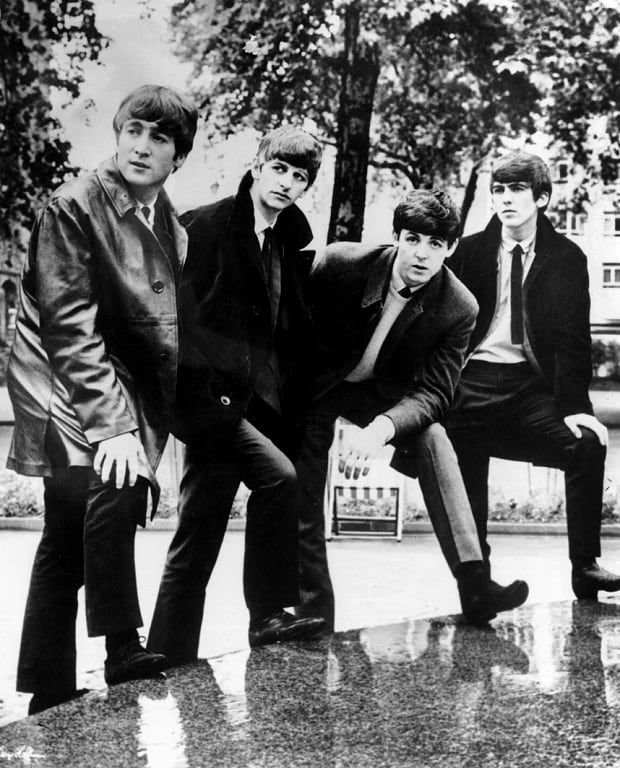There’s no question when tallying up the 1960s’ defining artist, that it’s hands down, without doubt, Liverpool’s finest cultural export, The Beatles.
The little Merseybeat band didn’t do too badly. Signed to EMI’s Parlophone in 1962, the Fab Four would land on the UK charts like a pop hurricane, a joyous soundtrack for a new youthquake, blowing away the cobwebs of their childhood post-war austerity and unencumbered by the National Service threat that had blighted young adults only a few years older.
With 1963’s Please Please Me debut LP barely behind them, ‘From Me to You’s’ harmonica strut unleashed Beatlemania’s dizzying fervour, breaking a dam of domestic pop stardom that carried a string of electric pop records, two feature films, and a mountain of merchandise around the peak of their cultural phenomenon.
Beatlemania would conquer the world. The moment their 1964 performance on CBS’ The Ed Sullivan Show was beamed into American households, the British invasion arrived, ready to dominate the Billboard Hot 100 with a cohort of UK acts from The Kinks, The Rolling Stones, and The Animals having similarly cut their teeth on the US’ rock and roll and blues heritage only a few short years earlier. But it was The Beatles that led the charge, with every American music fan clutching their Meet the Beatles! or Something New Capitol releases and calling the Fab Four their own as much as the fans in Eastern Asia, continental Europe, and the cohort of dissidents behind the Iron Curtain listening to their forbidden Samizdat Beatles records.
The Beatles were a thread across the decade, hurtling into the world from the embers of America’s rock and roll heyday through the emergence of the counterculture, soaring between LSD trips and the ensuing psychedelic revolution, and grinding to a halt in the roots rock resurgence that closed the decade.
While it’s true that The Beatles’ legacy has suffered from a bloated heritage industry that bludgeons the life out of their oeuvre with the ‘greatest band ever’ fawning, it still stands that there’s likely no other artist to come who will ever boast such a dazzling body of work with the vast creative scope the quartet dreamed up across sevenish years of recording.
Gleaning a conclusion to which of The Beatles’ cuts captures the 1960s is to indirectly ask what defines that turbulent decade. Do we examine the unreined primal howl of freedom that ‘She Loves You’ scores, the delirium of sexual liberation, and the wild abandon of a class system still fusted with Victorian mothballs? Perhaps we plumb for the underground’s lysergic excesses that coloured the hippies’ far out reaches for creative and spiritual epiphany with the expansive sounds of ‘Strawberry Fields Forever’ surrealist nostalgia?
Then there’s the beginning of the end for both The Beatles and the 1960s’ utopian idyll, cynically picking their double LP’s ‘Helter Skelter’ as the unwitting harbinger of murder in the Hollywood Hills and the ensuing dark clouds cast over the Woodstock generation.
While a blinder, it may be hard to argue ‘Paperback Writer’ as The Beatles’ number that best reflects the 1960s. Yet, landing in May 1966 with Rubber Soul behind them—and boasting the fantastic B-side ‘Rain’—Paul McCartney’s hard rock stomper dances on an electric pivot for both the band’s creative evolution and the cultural shifts taking place around them at a rapid pace.
‘Paperback Writer’s’ brimming confidence flexed the band still planted in the pop terrain that pleased their fans, but shaking off Beatlemania’s trappings in earnest, ceasing touring three months later and committing themselves to a purely studio project.
This realising of creative potential married the economic possibilities surrounding them, a hinterland of socially contracted freedom and ‘new money’ that afforded young people a new world far removed from their childhoods to chase goals and dreams without the former class obstructions that blunted options for many school leavers.
Far from the choking grip of disincentivising big state nannying today’s conservative ghouls, lambasting the post-war consensus, ‘Paperback Writer’ captures a moment in UK history when the land’s settlement provided tangible roads toward success, be it artistic or entrepreneurial, and stands as the ultimate testament to a band at the peak of their powers. Amid a climate where social democracy ensured a direct role in furthering and encouraging aspiration, all was channelled in McCartney’s charming vignette of the budding paperback writer’s letter to a publisher eager to strike gold.
